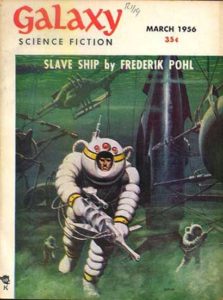The Serious Business of Science Fiction and Fantasy
I have friends who don’t quite get science fiction and fantasy and don’t really understand why I write it or publish it–in particular, friends at the Southern Baptist church I attend. (Note this post is adapted from something I wrote years ago on my personal blog.) By the way, by “science fiction and fantasy” I mean that broadly, to include supernatural fiction and alternate history and even horror with sci fi and fantasy settings, i.e. what is often but not always called “speculative fiction.”
In 2010-11 in Afghanistan and earlier in 2008 in Iraq I wrote a series of detailed emails about my military experiences, emails I forwarded on to friends and family, who as a general group gave me positive feedback about my ability to write about the experience of being a soldier at war and who praised me for doing a good job capturing what Afghanistan and Iraq are like. A few of these friends suggested that if I want to write fiction, I should be writing military thriller genre, like Tom Clancy or many other writers.
The truth is I could write in that genre. I mean, I’m capable of doing so. I’ve already written a few short stories that deal with modern military matters, which contain some information I know from some personal experience. I’ve also written some bits that relate to ancient and medieval militaries, drawing from both my personal observations about war and studies in history. And I’ve launched a series of articles that regular readers of Speculative Faith will have seen called the “Speculative Fiction Writer’s Guide to War”–those posts have been put on hold for a while, but I do intend to pick up writing them again until that series is complete, God providing I can find the time to do the research each of those articles requires.
I could do more along these lines of military-related writing and probably will someday. But as much as I’m interested in realistic military themes and in non-fiction, unreal worlds usually interest me more. I have no real passion for writing or publishing military fiction unless it’s also speculative. And on the other hand, I like plenty of speculative fiction with no connection to military themes at all.

Old science fiction magazine cover art with a military flair, now in the public domain.
I think there’s a positive reason why this is so, beyond the fact that I enjoy exercising my imagination. You see, writing science fiction and fantasy is serious business.
This statement may very much surprise friends of mine obsessed with politics or convinced this world is about to end soon…to them (as they only on occasion openly express), speculative fiction is sheer escapism from the world around us and spending time on it is acting like the proverbial ostrich with its head in the sand. Why be concerned with sci fi or fantasy when the real world around us has so much trouble that clamors for our attention?
I do want to acknowledge they have a tiny bit of a point. For some people, speculative lit really does seem to be nothing but escapism. And the complete pursuit of such escapism really could cause someone to fail to pay attention to what’s going on around them. There are times when it is absolutely essential to pay attention to the moment you are in and not wander off mentally to realms of things that are not. Though a devotion to speculative fiction may be more of a symptom of a withdrawal from the real world rather than a cause.
But I believe worlds of speculation, of the unreal, serve a very important function for most people whether they realize it or not. They remind people this world we dwell in is not the only world that affects our actions. What the world once was isn’t just the stuff of known history, but lies in the sphere of the unknown and legendary as well…and such legends have the power to live in human imaginations right now, to shape our conversations and thoughts. And the world we see changing around us is headed into a future of things uncertain for us, perhaps leading to a world of advanced technology, or perhaps a dystopian or post-apocalyptic collapse into decay and death. Speculating about what the consequences may be in the future of actions we’re taking now may be able to help us live in the present with greater knowledge and wisdom.
Fantasy and science fiction explore these other realities and help us understand the here and now in context of what could have been or what or could be.
But most important: This world is not all there is shouts speculative fiction, pointing out a void in our human lives. We long for things we’ve never seen as human beings, one of the odd and interesting things about us. And while it certainly can be true that human fiction, including speculative fiction, can be a sin-tainted expression of a corrupt imagination, the void in us longing for something else goes far beyond that. That void truly longs for God and the unknown elements of his created work, the Creator whose imagination far exceeds that of any human being, who has the power to create new worlds at a whim (whether he has exercised that power or not), who has hidden genuine mysteries in the mind-boggling physics of real world that surrounds us, and who will bring to an end most things we humans think are important now and establish his own rule.
Christians may feel we know our future eternity very well from the book of Revelation: pearly gates, throne of God, singing praises, New Jerusalem on Earth, etc. But we have every reason to believe eternity with God has got to include elements we’ve been told nothing about, if for no other reason because eternity is such a long time. And even a simple statement in Revelation that the streets are made of gold but transparent tells us that the the gold there will be significantly different from gold as we know it (assuming literal gold is meant–but a visual representation of figurative gold doesn’t make the future any less unexpected). There are many other details in Revelation like that, things that seem to make no sense but ultimately point to a future that will represent a world unlike our own. Again, there’s every reason to think the actual truth about eternity is that we only know the tip of the iceberg.
Science fiction and fantasy tap into a desire to see and experience things that amaze us, things that boggle our minds–which will be one part of what eternity will be like.

A fantasy world represented in an old magazine cover, now in the public domain.
And not only is the full reality of what world awaits us who have faith in Christ unknown, it’s unknown how long it will be before the end of time as we know it comes. Yes, some people act awfully certain that we are in the “End Times” and the end of this world will come very soon. But while I agree Christian believers should anticipate the Lord’s return, who can say for certain if our world won’t endure for twenty thousand more years before that happens–and what will happen in the meantime? Perhaps our world will become very different than it is now, as is seen in much of science fiction–perhaps we human beings will even explore other starts, only for those adventures to eventually die out, leaving the human race restricted to Planet Earth alone as the book of Revelation seems to indicate.
And who’s to say for certain that God hasn’t created other inhabited universes in parallel with our own, as occurs in most realms of fantasy? Perhaps discovering other universes will be part of what happens in eternity.
In the end, I create and publish the kinds of stories I do, not only to exercise in a positive way the faculty of imagination God gave me, but to reinforce the truth that this world is neither all there is, nor all there is to be. I also desire to spin visions of the unreal that specifically point fingers back toward the creator God, the author of all things. As much as I may engage in flights of whimsy at times, science fiction and fantasy as I know and love them for me rest on a bedrock foundation of this serious purpose.
I assume the same is true for most of you reading this post. But if you disagree or wish to add your own thoughts on the ultimate purpose of speculative fiction, please share your thoughts in the comments below.










































Speaking of alternate universes, has anyone else read “The Dark Tower”–a novel fragment by C.S. Lewis?
For some reason a lot of Christians got upset after its publication. Said Lewis couldn’t write anything so ungodly.
Why was it ungodly? Because it was “dark.” *Eye roll.*
Yeah. Don’t write dark stuff for the general Christian population. They’ll crucify you. “Where’s my happy ending? Screw you, and I hope you burn!” That sounds crude, but honestly, that’s the attitude, and I hope the irony isn’t lost. When we say, “That isn’t pleasing to God,” we should be careful not to confuse our own pleasures with God’s.
I hadn’t even heard of that novel fragment prior to now, Rachel. Where could I find a copy?
I imagine I will enjoy reading it, even if “dark.” Dark as in grim or scary can very much be laced with hope and genuine faith. Though some stories on the other hand can be dark in an unhealthy way…by no kidding celebrating evil.
But I find some of the most sinister stories are those that seem bright and happy and fun, but come laced with a stealthy celebration of sin.
Yeah. Or a denial of how evil or good actually function in reality. That’s true escapism.
I read The Dark Tower a long time ago, and then some years later a book by Kristine? Somebody that “proved” that C.S. Lewis did not write it, but rather the fragment was a hoax. I don’t know. The fragment is not like anything else he wrote. It would be interesting to run the fragment through one of those analytic programs that tell you who you write like.
Yes, it would be interesting, but a skilled writer can write like other writers if they want to.
I suppose someone can fake it well, but I think analytics based on word choices generally get consistent results.
And he definitely could – I know he wrote at least one book under a pseudonym and faked the style so it wouldn’t sound like him.
Interesting!
Every time I hear The Dark Tower I think of the Stephen King series. Even though I only read some of the graphic novels for those. :p
It’d be interesting to read a ‘dark’ novel by Lewis, though.
I want to read it now.
To be honest, his space trilogy wasn’t exactly cheerful, which is maybe why Narnia gets all the praise from the Christians who want the “nice stuff.” I recall the ending of That Hideous Strength involved a lot of animals gettin’ it on.
I think the greatest failing of the space trilogy is the longest of the three books didn’t take place in space at all. While NICE was interesting as a villain in a number of ways, Lewis set expectations with Out of the Silent Planet that he didn’t quite fulfill with Perelandra and totally ignored with That Hideous Strength.
Plus, while his Wood Between the Worlds opened the door with a metaphysics to any kind of alternate reality, he shut the door to Christian space adventure by claiming only Planet Earth could be permanently occupied by sinful humans or creatures like us. That was interesting, theologically speaking, but didn’t inspire Christians to go out and write sci fi the way Narnia inspired fantasy.
If we think about sci-fi and fantasy, the following may come to mind:
Talking animals
Fantastical beasts
Changing elements into others
Instant transportation from one location to another
Walking through solid objects
You know where I’m going with this of course. 🙂 All we need to do is read our Bibles to see how speculative faith is not always that speculative.
I’m like you, Travis. When I go on my morning or night time walks, my eyes lift up to gaze at the clouds, birds, stars, planets, moon, planes, and the occasional satellites I track on my phone. My heart is lifted up to those things–things that take me out of this world to the “what could be.” I’ve always been that way; I remember doing the same thing when I was five years old. And now as a new writer I want to share those stories and feelings with others.
Well, I definitely agree that fiction is useful and should be taken with a decent amount of seriousness. Interestingly enough, I recently had a conversation with someone that doesn’t take fiction seriously and I guess doesn’t try to learn from it or anything. It wasn’t that they were talking like fiction was a waste of time, just that they didn’t take it seriously and thought it was silly when other people did so. The conversation was after they said something that, out of context, sounded kinda despicable and another reader of the comic in question got mad at them because it sounded like they seriously meant it.
In a lot of ways, fiction is a way to run a simulation that can explore possibilities. It can help us learn about situations before we encounter them, or help people understand why certain things go wrong in their lives, and the best part is that since stories are entertaining, a lot of people will read willingly.
Lessons from stories can be a lot more deep because then people can actually see the scenario playing out and feel it on a more real and emotional level. Like, when having a conversation with someone, it’s one thing to say ‘if you do x, then y and z will happen’. That is often easy to dismiss. But if that whole scenario is shown in a well written story, suddenly, it’s easier to actually see the concepts being discussed.
Of course sci fi kind of does a lot of that when it comes to technology. I really like introducing a situation, world, or technology set to a story and then exploring how that would affect the chars’ society and behavior.
Nicely said… Great encouragement to keep writing!! Thanks!!
Fantasy and sci-fi touch the longing in our hearts for something beyond this world and greater than it, as you said. They remind us that we were made for more. As Ecclesiastes’ preacher says, “He has made everything beautiful in its time. Also, he has put eternity into man’s heart, yet so that he cannot find out what God has done from the beginning to the end.” The joy and longing that fantastical stories awaken in us are just one more reminder of the beauty we wait for God to reveal, of the eternity we were made for.
I recently had a conversation with two people I’m close to, one of whom adores Lord of the Rings and has read it many times (like me) and one of whom appreciates the story of Lord of the Rings through the movies, not having read the book, but feels that limited reading time is best spent on instructional nonfiction such as Bible commentaries. The other LotR reader and I agreed that if you can only read one book, you should of course read the Bible. The nonfiction reader said, “And if you can only read two books?” to which I immediately responded, “The Bible and LotR.” The other LotR reader said he agreed with my choice, for reasons of spiritual growth, not merely entertainment. I don’t think we persuaded the third person, which is fine– high-quality commentaries and theological books are of course very helpful and spiritually enlightening.
Great article. I agree with you wholeheartedly.
“Fantasy is an exercise bicycle for the mind. It might not take you anywhere, but it tones up the muscles that can.”
~Terry Pratchett